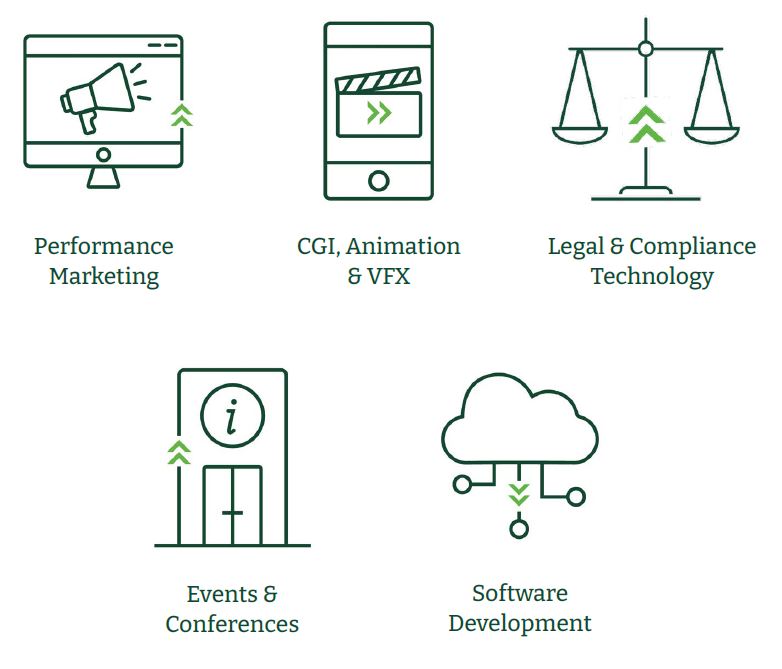JEGI CLARITY’s 20th Annual Media & Technology Conference in New York City brought together senior executives and investors from across the global media, marketing, information, and technology sectors.
At the conference, Philipp Mueller, Chief Analyst & Product Officer of Outsell moderated a panel titled, “Value Creation with AI – Productivity vs. Growth.”
The panel featured Sejal Amin, Chief Technology Officer of Shutterstock, Nikesh Kalra, Chief Operating Officer of DeepMedia, and Ilya Meyzin, SVP, Head of Data Science at Dun & Bradstreet.
The discussion kicked off with Philipp reminding the audience that ChatGPT was only launched 15 months ago. While there has been time to understand what real value creation with AI can look like, achieving it still remains elusive for a lot of companies. He continued by sharing findings from a survey conducted by Outsell in Q3 2023 that revealed that over 80% of senior executives were experimenting with Gen AI, with a third feeling very confident that it would drive productivity improvements in their enterprises. However, nearly half of the respondents lacked confidence in the ROI of their AI investments, with only 10% anticipating revenue and growth.
A lot has happened since ChatGPT was launched nearly 15 months ago.
Philipp Mueller, Chief Analyst & Product Officer of Outsell
The Impact of Generative AI on Productivity
Gen AI’s impact on productivity was the first area of discussion with the panelists.
Sejal Amin elaborated on Shutterstock’s utilization of Gen AI to enhance productivity across their operations by improving customer experience through actionable insights to their customer and sales teams, optimizing developer workflows, and bolstering infrastructure security.
Ilya Meyzin, added that Dun & Bradstreet had been employing LLMS for several years (large language models) to improve data quality, ingest data, and generate new types of insights.
The Issue of Trust and Safety with Gen AI
As Gen AI adoption increases, concerns regarding trust and safety become more acute.
Nikesh Kalra from DeepMedia discussed AI’s role in helping trust & safety teams combat nefarious content, which he quoted is now a $20bn market.
Adopting Gen AI solutions from the third quarter of last year, Ilya from Dun & Bradstreet, emphasized the importance of addressing biases and hallucinations in AI, implementing rigorous data governance practices, and most importantly, using trusted and validated data.
Gen AI models are amazing, but many of the leading models are trained on the entirety of the internet, and the internet is a Data Frankenstein.
Ilya Meyzin, SVP, Head of Data Science at Dun & Bradstreet
Shutterstock has been using AI well before Gen AI became the norm, explained Sejal, to understand the users and meet their needs through personalized search, recommendation engines and content discovery tools. With the growth of AI usage within their business, they had increased their trust and ethics practices.
Nikesh Kalra reminded the audience that generated content was not just gathered from social media, but also from Zoom calls and across other platforms. With even the larger news and information services now turning to user generated content from sources like TikTok, he spoke about a move towards greater investment in the authentication of the data supply chain.
Trust is ultimately all we really have to run a company, country, and the world on. Authenticating the supply chain of news, information, and data, is more important than it has ever been before.
Nikesh Kalra, Chief Operating Officer of DeepMedia
Licensing and Growth resulting from Generative AI
The conversation shifted to the potential to drive revenue and growth through Gen AI.
Dun & Bradstreet is navigating the delicate balance between licensing proprietary data and protecting market competitiveness, carefully weighing the revenue upside with strategic threats. Meanwhile, Shutterstock capitalized on its immense repository of assets through partnerships with Gen AI hyperscalers, resulting in their first deal with OpenAI in 2022. Sejal Amin, however, noted a shift in demand towards tailoring smaller data sets for more conversive models.
We have to understand the user and their needs because that is the core of everything we do… As we sell our data, keeping models clean is a huge part of the responsibility we have.
Sejal Amin, Chief Technology Officer of Shutterstock
What’s in store for Generative AI in 2024?
Finally, the panelists speculated on what the biggest development in AI would be in 2024.
For Nikesh Kalra it was the weaponizing of AI during the perfect storm of global elections, virality of social media, and the adoption of AI on a massive scale. Both Ilya Meyzin and Sejal Amin envisioned that the “rubber will hit the road” on Gen AI with worldwide enterprise adoption of it. Ilya also highlighted that in 2024 the emphasis on guardrails – LLM safety controls and protocols – will become increasingly important.
In conclusion, the discussion emphasized the potential of Gen AI to drive value, productivity, and growth, alongside the imperative of addressing the challenges of risk and governance for all.
For more information about our conference please click here.





